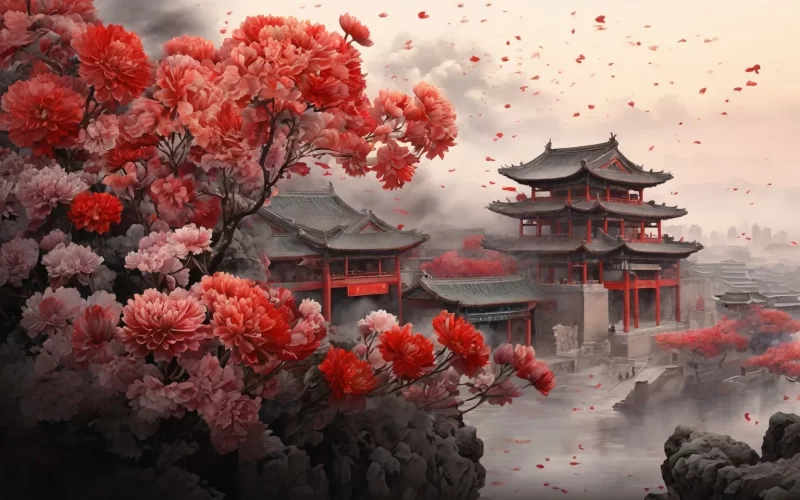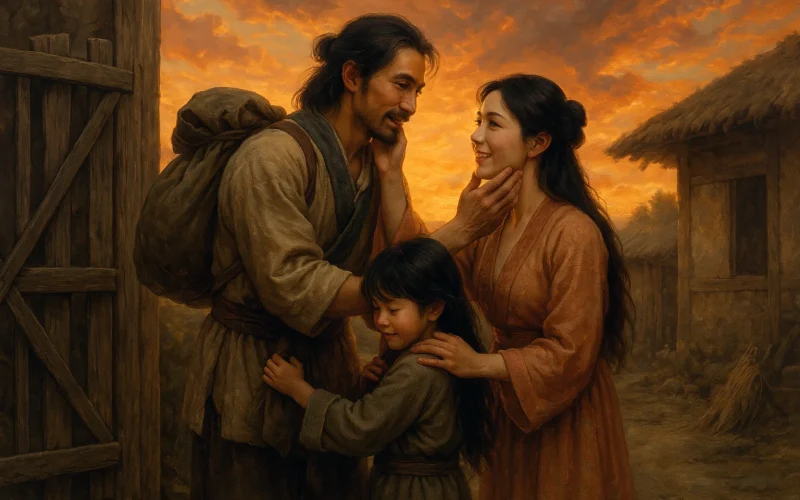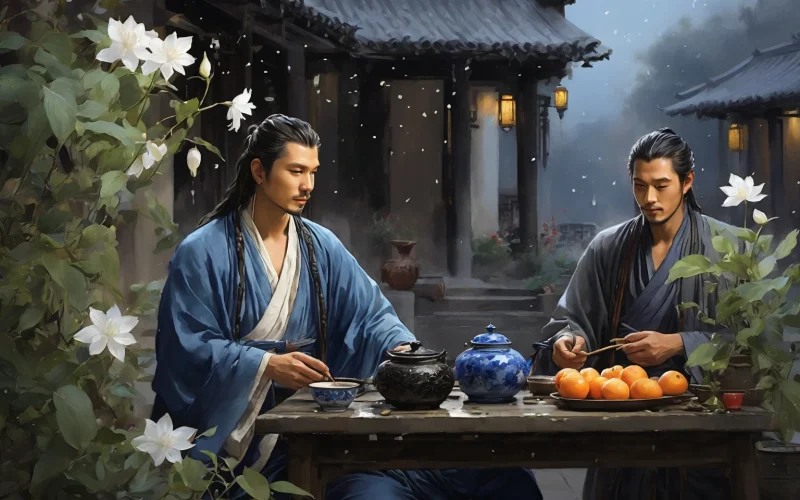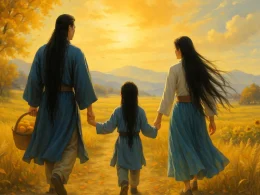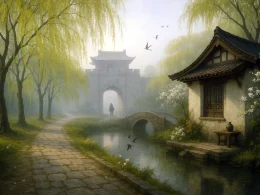Up the mountain I'd force myself to go,
But nobody would bring me wine around.
Chrysanthemums of my homeland should blow
To beautify the far-off battleground.
Original Poem
「行军九日思长安故园」
岑参
强欲登高去,无人送酒来。
遥怜故园菊,应傍战场开。
Interpretation
This poem was composed on the Double Ninth Festival (the ninth day of the ninth lunar month) in 757 AD, during the reign of Emperor Suzong of Tang. The An Lushan Rebellion had entered its third year. Chang'an had fallen the previous year, Emperor Xuanzong had fled to Shu, and Suzong had ascended the throne in Lingwu. Cen Shen was accompanying Suzong's mobile court, serving as a Reminder of the Right. This Double Ninth Festival, he was not climbing high and admiring chrysanthemums with family and friends in his old garden in Chang'an, but was adrift with the army. The word "with the Army" in the title pinpoints the unique time, space, and state of mind in which the poem was created—a traditional festival meant for reunion and celebration, now interwoven with the harsh realities of war, displacement, and a ravaged homeland.
This pentasyllabic quatrain is one of Cen Shen's most somber and introspective works, standing in stark contrast to the majestic grandeur of his frontier poems. It discards all elaboration of external scenery, pointing directly to the deepest pain within: against the backdrop of a shattered nation and lost home, even the most basic festive rituals (climbing high, drinking wine, admiring chrysanthemums) lose their original meaning, instead becoming mediums that exacerbate the pain of longing for home and country. Thus, the poem transcends personal nostalgia, becoming a microcosm of the fractured homeland memories and profound anxiety of a generation of scholars during the An Lushan Rebellion. With its immense emotional density and historical weight, it occupies a unique place in Tang poetry.
First Couplet: "强欲登高去,无人送酒来。"
Qiǎng yù dēng gāo qù, wú rén sòng jiǔ lái.
I force myself to climb the heights, for the ninth-day fête; / But no one comes with wine to share this lonely holiday.
The opening lines are filled with contradiction and a sense of powerlessness. "Qiǎng yù" (force myself) are the key words, meaning "to compel oneself" or "to do with great reluctance." They reveal the difficulty and futility of trying to maintain cultural habits and spiritual rituals under immense psychological resistance. Climbing high is a Double Ninth custom, but amidst raging war and a life of displacement, what joy can be found in it? "No one comes with wine" subtly alludes to a historical anecdote: Tao Yuanming of the Eastern Jin Dynasty once had no wine on the Double Ninth Festival, when Wang Hong, the Governor of Jiangzhou, unexpectedly sent him some. The poet uses this allusion to describe his actual situation (the loneliness of army life, no one mindful of the festival) and, on a deeper level, to express the pain of cultural rupture—the peaceful, elegant world where one could leisurely admire chrysanthemums and enjoy the company of friends has already collapsed. The individual is cast into a cold, alien reality stripped of cultural warmth.
Final Couplet: "遥怜故园菊,应傍战场开。"
Yáo lián gù yuán jú, yīng bàng zhàn chǎng kāi.
From far away I think with pain of our garden's chrysanthemum; / They must bloom now, forlorn, beside the old battlefield.
The poet's thoughts traverse space, flying back to occupied Chang'an. "Yáo lián" (think with pain from far away) is an emotional leap across distance, filled with the bitterness of being powerless to protect. The "chrysanthemum" of the old garden is the core Double Ninth image, symbolizing nobility, reclusion, longevity, and representing the peace and beauty of a secure home. Yet, the poet imagines they "must bloom… beside the old battlefield." These five words create a picture of immense impact, filled with absurdity and tragic beauty: the chrysanthemums, symbols of tranquility and beauty, are juxtaposed with the battlefield, symbolizing death and destruction. Their silent blooming here does not convey serenity but rather accentuates the desolate silence and ruthlessness of the battlefield; the presence of the battlefield utterly defiles and subverts all the beautiful values the chrysanthemums represent. This is the most poignant, poetic indictment of war.
Holistic Appreciation
This short, twenty-character pentasyllabic quatrain is a model of "conveying much with little." It is like a highly condensed emotional crystal, containing within its minute form violent tremors and profound sorrows on three levels: the personal, the cultural, and the national.
The poem employs a progressive structure "from the external (action) inward (state of mind), then from the self (personal) to the object (homeland)." The first two lines start with the futile action of observing the festival, focusing on individual loneliness and the loss of cultural ritual. The last two lines abruptly widen the perspective, projecting the personal "pity" onto the old garden a thousand li away. Through the shocking juxtaposition of "chrysanthemum" and "battlefield," personal melancholy is completely sublimated into compassion and reflection on the suffering of an entire era. The imagery of the chrysanthemum thus completes its transformation from a personal festive symbol to a totalizing symbol of a ravaged homeland and trampled civilization.
The poem's language is extremely spare, almost devoid of ornament, yet words like "force myself," "think with pain from far away," and "must… beside" are charged with emotional tension and the weight of judgment. It does not directly describe the horrors of war, yet achieves an artistic effect more startling than direct description through the imagined picture of "chrysanthemums beside the battlefield," embodying the aesthetic power of Chinese classical poetry—"implicit and restrained," "meaning beyond words."
Artistic Merits
- Seamless and Profound Use of Allusion: "No one comes with wine" subtly alludes to the Tao Yuanming story, yet it is fully integrated into the present situation. The use of this allusion is not for scholarly display but to contrast the warmth and refined camaraderie between scholars in historical memory with the interpersonal indifference and cultural desolation of the wartime present, giving the loneliness a profound historical depth.
- Subversive Juxtaposition of Imagery: The poem's core artistic creation lies in forcibly juxtaposing the two images "garden's chrysanthemum" and "battlefield," which belong to completely different, even opposite, semantic spaces ("beside… bloom"). This juxtaposition creates a powerful sense of semantic rupture and aesthetic shock, thereby expressing the condemnation of war and anxiety for civilization with penetrating force.
- Emotional Weight Borne by Function Words: The reluctance in "force myself," the helplessness in "think with pain from far away," the conjecture in "must… beside" (containing an almost certain cruel imagination)—these function words or functional phrases play a key role in conveying complex mental states and modulating emotional intensity, showcasing the extraordinary expressive power of classical Chinese in mastering complexity with simplicity.
- Cruel Intertextuality of Festival and Reality: The poem is built on the acute contradiction between the cultural script of the "Double Ninth Festival" and the wartime reality of "being with the army." Every mention of festive customs (climbing high, drinking wine, admiring chrysanthemums) deepens the contrast with the actual circumstances (loneliness, no wine, the old garden turned battlefield). This continuous clash between cultural memory and lived reality constitutes the poem's internal emotional driving force.
Insights
This small poem is like a silver needle piercing a historical wound; its insights are profound and painful. It tells us that when war flares, what is often destroyed first is not the brick walls of the city but that system of cultural rituals and emotional bonds that sustains the meaning of daily life and consoles the individual soul. The struggle of "forcing myself to climb the heights" is an experience modern readers can also empathize with—in the face of immense collective trauma or personal hardship, have we not also felt how difficult it is to maintain even the most basic rituals of life?
More importantly, the "pity from afar" for the "garden's chrysanthemum" reflects a broad compassion that transcends personal gain or loss. The poet's pain lies not only in his own inability to climb high and drink wine but also in thinking of those innocent, beautiful things in his homeland (like the chrysanthemums) suffering violation they should never have endured. This ability to connect one's own suffering with the suffering of wider others (even objects) is a sublime humanistic spirit.
Ultimately, this work warns us that the festive gatherings and hometown scenery that seem commonplace in times of peace are, in fact, civilization's most precious fruits, deserving our utmost wisdom and courage to protect. And the anguish Cen Shen preserved in poetry amidst the flames of war—this lament for "chrysanthemums blooming beside the battlefield"—is precisely the inextinguishable spark of civilization amidst ruins. It illuminates the suffering and heralds an unrelenting yearning for rebuilding and peace.
Poem translator
Xu Yuanchong (许渊冲)
About the poet
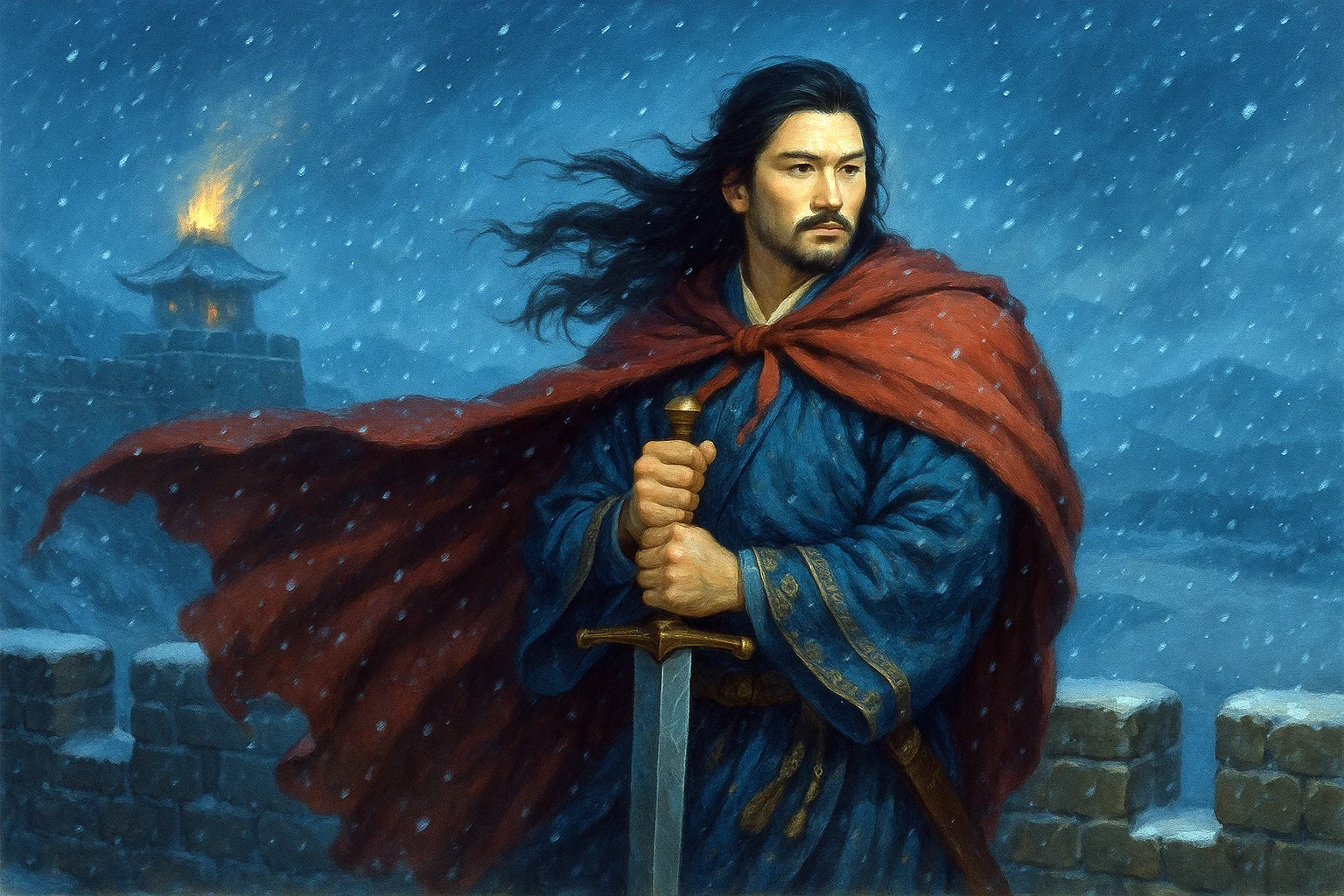
Cen Can(岑参), 715 - 770 AD, was a native of Jingzhou, Hubei Province. He studied at Mt. Songshan when he was young, and later traveled to Beijing, Luoyang and Shuohe. Cen Can was famous for his border poems, in which he wrote about the border scenery and the life of generals in a majestic and unrestrained manner, and together with Gao Shi, he was an outstanding representative of the border poetry school of the Sheng Tang Dynasty.






